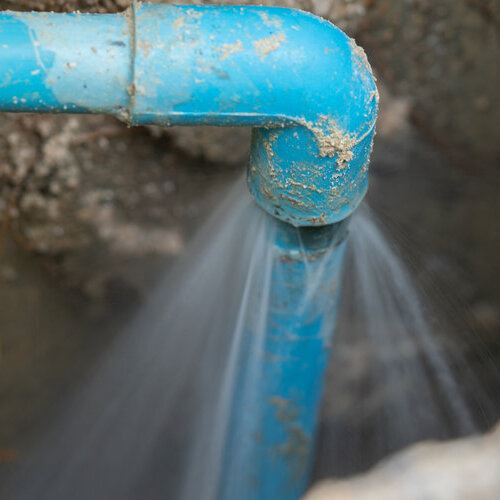Dealing With a Plumbing Leak
If you’re lucky, when your home has a plumbing leak, detection is obvious because there is water puddled up in the floor, or everything under the sink is wet. Unfortunately though, not all plumbing leaks are as easily discovered. If you need help with leak detection in Fort Worth, TX, the team at Molberg Plumbing LLC can be there to help when you call (817) 476-9963. Otherwise, read on to learn some valuable leak detection tips.
Signs You Have a Leak
You may not even know you have a leak, but there are things telling you there is a leak somewhere. Sometimes, you can’t find plumbing leaks because they’re underground. This is when you need special leak detection ability, equipment, or service for an underground leak detection test. What is a leak detection test?
A leak detection test will determine if and where a leak has transpired. A leak detection test can be used for gases or liquids by using one of three methods:
- Hydrostatic Testing
- Infrared
- Laser Technology
These three leak detection methods are used to test for leaks after gas or liquate pipelines have been created as well as once the lines are in service, like plumbing pipe leak detection in homes.
How can I tell if I have a water leak?
Well, on the downside, an obvious indication would be mildew and mold. There is a long-standing partnership with plumbing leak and mold and mildew. Consider them the three musketeers of homeownership horrors.
A water leak can become a dangerous situation if leak detection doesn’t find it pretty quick. Water may be dripping and trickling, but the damage it is doing is moving at warp speed. So, what are some indicators that will tell you there is a possible plumbing leak?
1. Water Bill is Unusually High
We all complain about our water bills being high, but they are usually consistent. A home’s average water bill won’t vary more than $10 to $15 each month unless you’ve had a lot of overnight guests or filled a swimming pool. Any spike in the water bill otherwise may be indicating you need a leak detection test.
2. Heat Water Running
The sound of water running should be investigated by checking all the faucets and toilets inside and the outside spigots. If everything is off, check the water meter. When you know every water-based thing in your home is off, the toilets are filled, etc., watch the water meter. If it is spinning, you have leak detection! If it isn’t spinning, write down the reading, wait an hour, and check it again. If there are any changes in the reading, you have leak detection.
3. Damp or Wet Floors
As you walk across a carpeted room and suddenly feel a squish under your foot, you’ll probably blame it on a pet or a spill. When that has been cleared up and nothing like that has happened, you may have a slab leak either from plumbing or sewer lines. You can’t ignore this, because that moisture is going to keep coming back and it is spreading further and further throughout your home. Those three musketeers we talked about earlier, plumbing, mildew, and mold, are doing their thing now. As you know, mold can become a toxic situation, a health danger. Call for professional leak detection immediately.
4. Foul Smells
You notice a foul, unpleasant smell and can’t find it, so you light a candle and go on about your day. What if that foul odor is from mildew or mold though? That candle isn’t going to do any good. You likely have a plumbing issue somewhere in your home and that mildew and mold are going to keep growing and spreading until you have found the source with leak detection and fixed it.
5. Green Patches and Overgrowth in the Lawn
Unless you have extra fertilized your lawn in a certain area any green, lush patch of grass or a concentrated wet spot could be an indication of a sewer or water line leaking. This is allowing hazardous bacteria to grow and spread throughout your lawn. Call for a professional leak detection service as soon as possible.
6. Cracked Ceilings and Walls
The smallest plumbing leak can cause your foundation to crack. Those cracks will cause the floors and walls to crack and work their way to the ceiling. That leak will continue to spread, your foundation will shift, even sink. The sooner you have leak detection done to find the cause and fix it, the better.
How do you check for plumbing leaks?
Water is a wonderful natural source that we use every day. It can also be the enemy, and when mildew and mold follow, they are a destructive trio. Even a newer home can have an undiscovered leak. Detection is key in stopping the damage, and there are several ways to perform leak detection yourself.
One is the water meter trick we mentioned above and paying attention to large jumps in the water bill as we discussed earlier. The green, lush spots in the yard and cracks in the floor, walls, or ceiling are easy leak detection. A few other leak detection things you can yourself are:
- Check Appliances and Fixtures
If the leak detection testing we’ve mentioned does not indicate any leaks, check under all the cabinets in the bathrooms and kitchen. Look for unexplained dampness or water puddles. Check around the dishwasher, washing machine, and water heater too.
You may want to make this a routine check just to stay on top of things, especially an older home. If you have any leak detection with these checks, check all the water valves are tight and if that doesn’t stop it, call a plumber.
If all the appliances and fixtures check good and all the other leak detection methods we’ve mentioned came up dry, check the toilet. The flapper inside the tank wears out over time and allows water to keep a trickle going from the tank to the bowl. This is costing you money! Put a little food coloring in the tank and if the flapper is leaking, you’ll have colored water in the toilet bowl pretty quick.
What is plumbing leak detection?
There is leak detection equipment that homeowners can purchase now. Plumbing leak detection is a way to monitor the water flowing through plumbing lines. When the flow is abnormal, there are leak detection systems that will shut the water off entirely. With this type of leak detection, there is less damage to homes and lawns, not to mention the money saved on the monthly water bill.
While this type of leak detection equipment is a great homeowner help, it doesn’t do the job that plumber’s leak detection can do. They have cameras and other equipment that will travel into the pipeline and find the exact spot where the leak is happening.

The One Question We All Have – Is a water leak covered by homeowners insurance?
It will depend on your homeowner insurance policy and what it covers. If the insurance adjuster deems the leak was due to homeowner neglect or simply aging of the pipes, then no, your claim will likely be denied. With simple aging of pipes though, your insurance may cover for any replacement of personal items, flooring, etc., but not the leak repair. Review your policy with your agent once a year so that you are current on what your coverage offers. Knowing ahead of time will save you some headaches and worry later. Meanwhile, if you need any help finding leaks with leak detection in Fort Worth, TX so you can get the issue fixed, contact Molberg Plumbing LLC at (817) 476-9963 to get things started.
